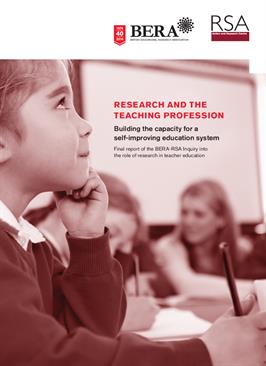Enquiry-based (or 'research-rich') environments are the hallmark of high performing education systems. Drawing on a wide range domestic and international evidence, including seven commissioned papers by leading experts, the report sets out clear principles for developing a research-rich and self-improving educational system. It puts forward practical recommendations on a range of issues including initial teacher education; continuing professional development; research leadership and capacity; and teacher engagement.
Research has a key role to play in identifying strategies that have the best chance of improving outcomes for learners. Yet, there are concerns that the current educational environment militates against teachers engaging with and in research. The report looks at what specific steps would help create a research-rich culture in schools and colleges.
The report identifies how research can make a contribution to teacher education by:
- Informing the content, design and structure of teacher education programmes:
- Ensuring that teachers and teacher educators are able to engage with and be discerning consumers of research; and
- Equipping teachers to conduct their own research, individually and collectively.
Focusing on five key areas - teaching and learning; teachers’ professional identity and practice; school and college leadership; system-level responsibilities; and research production - the report articulates a set of principles for a research-rich educational environment.
Practitioners and policymakers in England, Scotland, Wales and Northern Ireland face different challenges. The report, therefore, made specific recommendations for each. The issues covered by the recommendations include research leadership, teachers’ and headteacher standards, inspection frameworks, quality assurance, initial teacher education, continuing professional development, practitioner engagement, collaborative practice and research capacity.
Key recommendations for England included:
- Establish a National Network of Research Leaders in Education whose members span the full professional community.
- Make research literacy an explicit criterion for gaining qualified teacher status and progressing to middle or senior leadership roles in schools and colleges.
Key recommendations for Scotland included:
- Prioritise funding for partnership proposals among schools, colleges, local authorities and universities that are focused on developing teachers’ research literacy and engagement.
- Local authorities should organize at least one dissemination event a year, focused on sharing examples of enquiry-based learning and research-rich practice.
Key recommendations for Wales included:
- University leaders as well as university departments and faculties of education should nurture research capacity that is directly relevant to the needs of schools and colleges and, in particular, that is relevant to the Welsh medium sector.
- Review the professional standards for educational practitioners in Wales, including the standards for Qualified Teacher Status, to ensure that they embody research and enquiry as an important strand in every teacher’s professional identity and practice.
Key recommendations for Northern Ireland included:
- Establish a statutory entitlement to continuing professional development for all teachers.
- Revise the Teacher Competency Framework so as to make this a more helpful working document for schools promoting research informed reflective practice.
pdf 2 MB

Be the first to write a comment
Comments
Please login to post a comment or reply
Don't have an account? Click here to register.